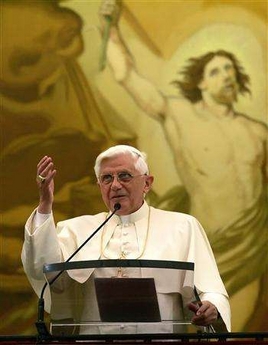 By Anne Applebaum , Already, angry Palestinian militants have assaulted seven West Bank and Gaza churches, destroying two of them. In Somalia, gunmen shot dead an elderly Italian nun. Radical clerics from Qatar to Qom have called, variously, for a "day of anger" or for worshipers to "hunt down" the pope and his followers. From Turkey to Malaysia, Muslim politicians have condemned the pope and called his apology "insufficient." And all of this because Benedict XVI, speaking at the University of Regensburg, quoted a Byzantine emperor who, more than 600 years ago, called Islam a faith "spread by the sword." We’ve been here before, of course. Similar protests were sparked last winter by cartoon portrayals of Muhammad in the Danish press. Similar apologies resulted, though Benedict’s is more surprising than those of the Danish government. No one, apparently, can remember any pope, not even the media-friendly John Paul II, apologizing for anything in such specific terms: not for the Inquisition, not for the persecution of Galileo and certainly not for a single comment made to an academic audience in an unimportant German city.
By Anne Applebaum , Already, angry Palestinian militants have assaulted seven West Bank and Gaza churches, destroying two of them. In Somalia, gunmen shot dead an elderly Italian nun. Radical clerics from Qatar to Qom have called, variously, for a "day of anger" or for worshipers to "hunt down" the pope and his followers. From Turkey to Malaysia, Muslim politicians have condemned the pope and called his apology "insufficient." And all of this because Benedict XVI, speaking at the University of Regensburg, quoted a Byzantine emperor who, more than 600 years ago, called Islam a faith "spread by the sword." We’ve been here before, of course. Similar protests were sparked last winter by cartoon portrayals of Muhammad in the Danish press. Similar apologies resulted, though Benedict’s is more surprising than those of the Danish government. No one, apparently, can remember any pope, not even the media-friendly John Paul II, apologizing for anything in such specific terms: not for the Inquisition, not for the persecution of Galileo and certainly not for a single comment made to an academic audience in an unimportant German city.But Western reactions to Muslim "days of anger" have followed a familiar pattern, too. Last winter, some Western newspapers defended their Danish colleagues, even going so far as to reprint the cartoons — but others, including the Vatican, attacked the Danes for giving offense. Some leading Catholics have now defended the pope — but others, no doubt including some Danes, have complained that his statement should have been better vetted, or never given at all. This isn’t surprising: By definition, the West is not monolithic. Left-leaning journalists don’t identify with right-leaning colleagues (or right-leaning Catholic colleagues), and vice versa. Not all Christians, let alone all Catholics — even all German Catholics — identify with the pope either, and certainly they don’t want to defend his every scholarly quotation.
Unfortunately, these subtle distinctions are lost on the fanatics who torch embassies and churches. And they may also be preventing all of us from finding a useful response to the waves of anti-Western anger and violence that periodically engulf parts of the Muslim world. Clearly, a handful of apologies and some random public debate — should the pope have said X, should the Danish prime minister have done Y — are ineffective and irrelevant: None of the radical clerics accepts Western apologies, and none of their radical followers reads the Western press. Instead, Western politicians, writers, thinkers and speakers should stop apologizing — and start uniting.
By this, I don’t mean that we all need to rush to defend or to analyze this particular sermon; I leave that to experts on Byzantine theology. But we can all unite in our support for freedom of speech — surely the pope is allowed to quote from medieval texts — and of the press. And we can also unite, loudly, in our condemnation of violent, unprovoked attacks on churches, embassies and elderly nuns. By "we" I mean here the White House, the Vatican, the German Greens, the French Foreign Ministry, NATO, Greenpeace, Le Monde and Fox News — Western institutions of the left, the right and everything in between. True, these principles sound pretty elementary — "we’re pro-free speech and anti-gratuitous violence" — but in the days since the pope’s sermon, I don’t feel that I’ve heard them defended in anything like a unanimous chorus. A lot more time has been spent analyzing what the pontiff meant to say, or should have said, or might have said if he had been given better advice.
All of which is simply beside the point, since nothing the pope has ever said comes even close to matching the vitriol, extremism and hatred that pour out of the mouths of radical imams and fanatical clerics every day, all across Europe and the Muslim world, almost none of which ever provokes any Western response at all. And maybe it’s time that it should: When Saudi Arabia publishes textbooks commanding good Wahhabi Muslims to "hate" Christians, Jews and non-Wahhabi Muslims, for example, why shouldn’t the Vatican, the Southern Baptists, Britain’s chief rabbi and the Council on American-Islamic Relations all condemn them — simultaneously?
Maybe it’s a pipe dream: The day when the White House and Greenpeace can issue a joint statement is surely distant indeed. But if stray comments by Western leaders — not to mention Western films, books, cartoons, traditions and values — are going to inspire regular violence, I don’t feel that it’s asking too much for the West to quit saying sorry and unite, occasionally, in its own defense. The fanatics attacking the pope already limit the right to free speech among their own followers. I don’t see why we should allow them to limit our right to free speech, too.



